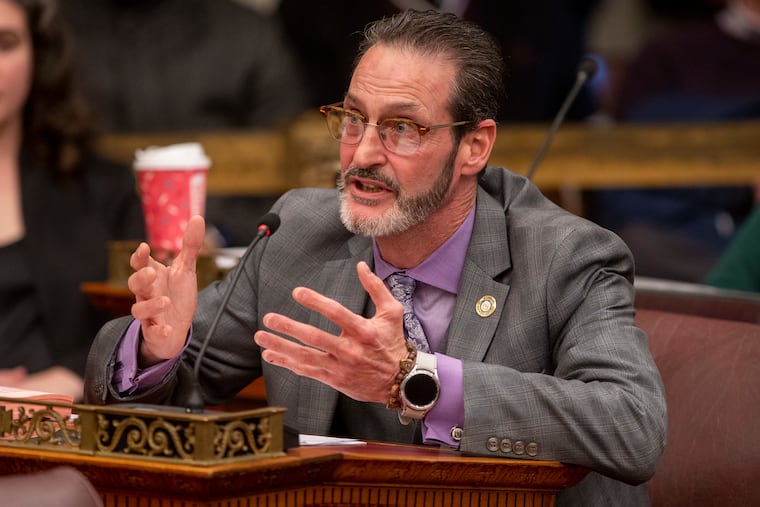Philly lawmakers want to hear from city workers about Mayor Parker’s return-to-office policy
City Council on Thursday passed legislation to hold hearings on the city’s hybrid work capabilities. Lawmakers also passed legislation aimed at probing the process by which people seek drug treatment.

Philadelphia city workers will have an opportunity to tell lawmakers why they should retain the ability to work remotely after Mayor Cherelle L. Parker ordered all employees to return to in-person work five days a week.
City Council on Thursday passed legislation to hold hearings on the city’s hybrid work capabilities, a move that comes just days after leaders of one of the city’s largest municipal unions blasted Parker’s return-to-office plan.
Councilmember Jim Harrity, a close ally of both Parker and of organized labor, called for the hearings and said while he understands Parker’s policy, he wants to provide workers an opportunity to be heard. He said his call for hearings shouldn’t be interpreted as an indication that Council opposes employees returning to work in-person.
“I’m curious to know: Has [remote work] been working? We want to hear it right from them,” said Harrity, who represents the city at-large. “And at least they can voice their opinion.”
Parker announced Monday that all city employees must return to in-person work full-time by July 15, a policy she said will foster better collaboration among workers and lead to more effective city service delivery. She said about 80% of the 25,000-member workforce was already working in-person.
» READ MORE: Mayor Cherelle Parker’s return-to-office policy causes rift with union leaders
But leaders of AFSCME District Council 47, which represents thousands of the city’s professional and supervisory employees, immediately criticized the plan and said that it is subject to collective bargaining. The union has not said whether it intends to take legal action to try to block the policy or force the administration to negotiate it.
Robert Harris, vice president of D.C. 47, testified in favor of holding hearings.
“To fully understand and appreciate the perspective of city workers regarding the return-to-office policy, it is imperative for the administration [and] City Council to have good-faith discussions with the city workers and the community,” he said.
Hearings have not yet been scheduled.
Here’s what else happened in Philly City Council on Thursday:
Your property tax bill could soon decrease
City Council President Kenyatta Johnson authored legislation that would increase the city’s homestead exemption, a popular property tax relief program for homeowners that can reduce annual bills by more than $1,100.
Under Johnson’s proposal, the assessed values of owner-occupied properties could be reduced by $90,000 — the exemption currently allows for an $80,000 reduction.
That increase is more modest than the one Johnson championed two years ago amid soaring property values. That year, the city increased the exemption to $80,000 from $45,000.
Johnson said Thursday that his proposal represents an opportunity to provide tax relief to homeowners as the administration prepares to issue property reassessments this year.
Parking permits are likely to get more expensive
Philadelphians will pay more for residential parking permits and face new restrictions on the number of permits allowed per household under legislation passed Thursday by City Council.
The bill now heads to Parker’s desk. If she signs it, residents will soon be required to pay $75 for a parking permit, an increase from the current pricing structure, which sets a household’s first vehicle permit at $35.
Currently, the price increases for subsequent permits from there, but there is no limit on the number of parking permits a single household can obtain. That would change under the legislation, which says no more than three residential parking permits can be issued for a single residence.
The bill also gives the Philadelphia Parking Authority the power to increase the price of permits itself and without Council’s approval beginning in 2026, however, the PPA may only do so once every three years.
Council to investigate treatment availability in Kensington
A new special committee dedicated solely to examining the city’s strategy in Kensington is poised to examine the availability of drug treatment in the neighborhood and explore the barriers people face to receiving care.
Councilmember Quetcy Lozada, whose district includes Kensington and who has led the charge in Council to change conditions in the neighborhood, introduced legislation Thursday to hold hearings on the “limited bed availability” in the neighborhood.
It notes that people who use drugs face significant barriers to entering various forms of treatment and shelter, including severe withdrawal symptoms, long wait times, language access, and limited options for couples.
One fun thing: Wedding bells are ringing
Congratulations to Councilmember Jeffery Young Jr., a new member who represents North Philadelphia’s 5th District. He’s getting married this weekend.
Inquirer staff writer Jake Blumgart contributed to this article.